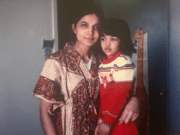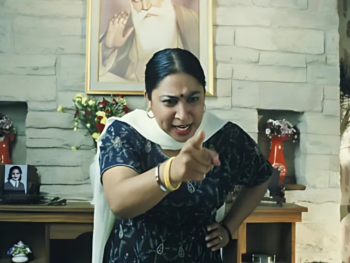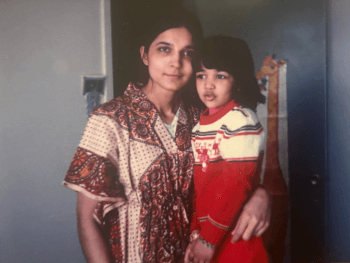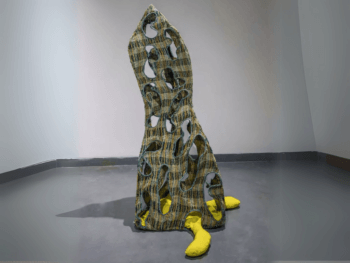
Psychological abuse can be just as, if not more, painful than the obvious signs of domestic abuse.
When it comes to love and a happy marriage, sometimes we need to be brutally honest with ourselves – we are living in reality. As much as the truth hurts, life is not a picturesque Bollywood love story where everything ends in “happily ever after.” Sometimes what seems like “true love” ends in abuse.
If you look up the medical terminology for psychological abuse, it is referred to as “a person subjecting or exposing another to behaviour that may result in psychological trauma, including anxiety, chronic depression, or posttraumatic stress disorder,”
In most abuse cases, we see the woman as the victim. And sadly, for many women across the world, they don’t see the signs of abuse until it’s too late and someone gets hurt. People think that the idea of abuse is only when someone hits, pushes, pulls, or physically harms someone in another way. But that is not always the case.
In 2011, a poll conducted by Glamour Magazine and executive editor Wendy Naugle, showed “30 percent of women who have been in a relationship have been abused. Of that 30 percent, 62 percent were hit, 33 percent were choked or strangled, and 11 percent feared their partner would kill them. Even more shocking, another 30 percent of the women said they had experienced behaviours by their partners that can be categorized as abusive, whether they be emotional or physical.”
Even though we are living in 2012, there are many women who suffer from this. When reading this article, we must keep in mind that psychological abuse is happening to women right now, at this very moment, in different corners of the world. And sadly, in many cultures, women are forced to hide from others when this happens to them.
In the following two stories, the women are fictitious — let’s say: the women were given pseudonyms to protect their identities, but their stories are true. In these stories, you are going to learn the warning signs of psychological abuse so that if this happens with you or someone else, you can stand up and speak up.
Jhanvi was a bubbly young girl. She graduated college with honours and went on to attain her Master’s Degree. She fell in love with one of her classmates and they were later married. Jhanvi moved to Los Angeles with her husband and slowly started to notice that he was making every choice for her. When she would get ready to go out, he would say, “I don’t like the top you’re wearing, go up and change.” When she made plans to see her friends, he would say, “I don’t like your friends; you don’t need to hang out with them. They aren’t good for you.” Soon he was telling her, “Why do you need to go back home so often? Tell your parents to come here and visit you. You don’t need to go there….” Jhanvi didn’t notice the signs, but she was being psychologically abused through her husband’s controlling behaviour.
Control is one of the f irst signs of psychological abuse. In this aspect, one partner tries to control everything aboutthe other partner, from their daily habits to their entire lifestyle. Jhanvi’s husband was also displaying abusive expectations, such as telling her that he didn’t want her to spend time with her friends, or even her parents.
Khushboo has been married to her husband for a year and half. At first their marriage was “perfect” in everyone’s eyes. But slowly things began to change. For a few days she was feeling sick. One night she came home from work, extremely tired, but without saying anything, cooked dinner for her husband and herself. When dinner was over, her husband went to pack the leftovers and saw there were none. He immediately turned to her and said, “Are you stupid? Don’t you know how much food to cook? What will I take for lunch tomorrow? You can’t do anything right.” Her eyes filled with tears and he went off into the living room to watch TV. They both eventually made their way to the bedroom and her husband turned the other way. She tried to talk to him but he ignored her. Finally she apologized and he merely said, “It’s alright; don’t let it happen again.”
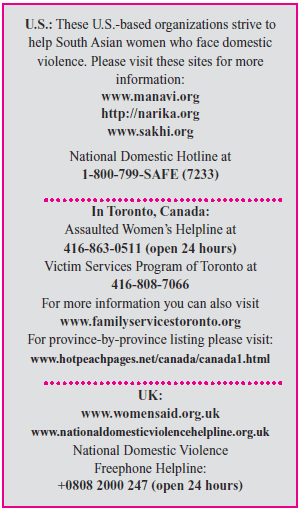
Little did Khushboo know that this was emotional abuse, another sign of psychological abuse. Many women, in relationships such as the above, never think of their situation as emotional abuse but it is moreover a form of emotional blackmail. According to psychotherapist Susan Forward, who did much to popularize the term, “emotional blackmail,” it is a powerful form of manipulation in which blackmailers who are close to the victim threaten, either directly or indirectly, to punish them to get what they want.
And we see just that in the story above. Khushboo’s husband is playing on her guilt and compassion in order to get what he wants and that she would apologize for something she didn’t do. We also see that the emotional blackmail includes one partner giving the other the cold shoulder: Whenever Khushboo would try to get closer to her husband, he would turn her away. Also in the example above, Khushboo’s husband is mentally playing with her, making her feel that she has done something wrong even though she hasn’t. This dynamic suggests an unhealthy relationship. It is in this type of situation where the victim needs to find someone whom they can confide within and discuss these issues with. It could be a friend, counsellor, coworker or someone else who they feel close and safe with. As we can see, psychological abuse can be both verbal and nonverbal. But one must also remember that mental and emotional abuse hurts just as much, if not more, than physical abuse. I spoke to clinical psychologist, Dhara Thakar, PhD, in regards to the symptoms and risks associated with domestic violence, and she stated, “Victims are made to feel powerless and insignificant, and may even doubt their ability to successfully leave the relationship. In addition, they are likely to withdraw from their support networks, embarrassed and scared to disclose the realities of the abuse they have endured. Without appropriate support or more formal interventions, emotional and/or physical abuse can take a toll on the victim’s mental health, sometimes leading to post-traumatic stress disorder and depression.”
Thakar went on to further affirm that, “the effects of verbal and emotional abuse may often persist well after the physical signs diminish.”
If you’re reading this and the actions in the examples above sound familiar, ask yourself: Is my selfrespect worth this pain?
If you answered “no,” then you should try to look for the following signs of verbal/nonverbal abuse, which may include, but not limited to:
- Humiliating the victim
- Controlling what the victim can and cannot do
- Withholding information from the victim
- Deliberately doing something to make the victim feel diminished or embarrassed
- Isolating the victim from friends and family
- Denying the victim access to money or other basic resources
If one chooses to do so, they can see a counsellor or seek therapeutic intervention; a counselor won’t tell you what to do, but she will give you a safe environment so that one could possibility come to a conclusion or understanding of what to do.
We are each brought into this world to bring about something special of our own and if our hopes, dreams, and values are diminished every day, we slowly start to lose faith in ourselves.
BY TIRUSHA DAVE / PUBLISHED IN THE HEALTH & WELLNESS ISSUE, JULY 2012

















